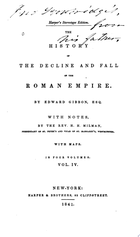Volume 1, Chapter 2 "Of the Union and Internal Prosperity of the Roman Empire, in the Age of the Antonines" http://www.ccel.org/ccel/gibbon/decline/files/volume1/chap2.htm. The portion regarding the views of the religions of the time taken by various constituencies has been misreported as Gibbon's own assessment of religion generally. See Paul F. Boller, John George, They Never Said It: A Book of Fake Quotes, Misquotes, and Misleading Attributions (1990), pp. 34–35.
The bold text has been misattributed to Lucretius and Seneca the Younger.
The Decline And Fall Of The Roman Empire (1776)
Source: The Decline and Fall of the Roman Empire
Context: The various modes of worship, which prevailed in the Roman world, were all considered by the people, as equally true; by the philosopher, as equally false; and by the magistrate, as equally useful. And thus toleration produced not only mutual indulgence, but even religious concord.
Context: The policy of the emperors and the senate, as far as it concerned religion, was happily seconded by the reflections of the enlightened, and by the habits of the superstitious, part of their subjects. The various modes of worship, which prevailed in the Roman world, were all considered by the people, as equally true; by the philosopher, as equally false; and by the magistrate, as equally useful. And thus toleration produced not only mutual indulgence, but even religious concord.
The superstition of the people was not embittered by any mixture of theological rancour; nor was it confined by the chains of any speculative system. The devout polytheist, though fondly attached to his national rites, admitted with implicit faith the different religions of the earth. Fear, gratitude, and curiosity, a dream or an omen, a singular disorder, or a distant journey, perpetually disposed him to multiply the articles of his belief, and to enlarge the list of his protectors. The thin texture of the Pagan mythology was interwoven with various but not discordant materials.

